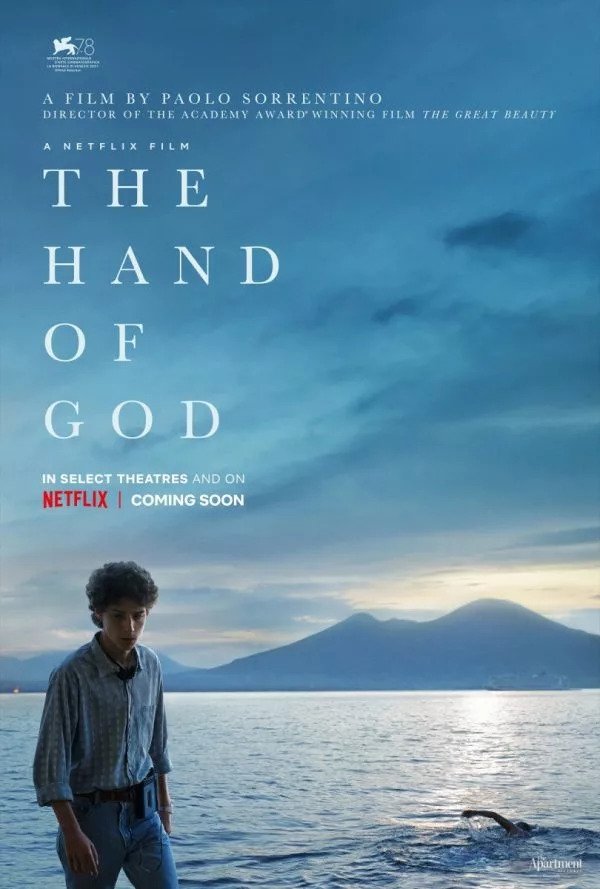
Directed by Paolo Sorrentino.
Starring Filippo Scotti, Toni Servillo, Teresa Saponangelo, Marlon Joubert, Luisa Ranieri, Renato Carpentieri, Massimiliano Gallo, Betty Pedrazzi, Biagio Manna and Ciro Capano.
SYNOPSIS:
This story of love, loss and family feuds is set in Naples with Fabietto (Filippo Scotti) at the epicentre. His father (Toni Servillo) and mother (Teresa Saponangelo) fight, feast and fornicate both home and away, while friends and relations do likewise.

There is something effortlessly cool about Paolo Sorrentino’s The Hand of God. With the masterful eye of a filmmaker in love his subject matter, small intimate domestic dramas are offset by sweeping panoramic shots of the Italian shoreline. El fresco dining, adolescent preoccupations and familial dramas play out in the balmy heat of a World Cup summer.
Fabietto (Filippo Scotti) is the youngest son of Saverio Schisa (Toni Servillo). A man who is hiding secrets, trying to fulfil his role as husband, and provide for his family. Fabietto is the observer, innocent party and dutiful son, who divides his time between lusting after his overtly sexual aunt Patrizia (Luisa Ranieri) and obsessing over Diego Maradona.
Writer-director Paolo Sorrentino draws humour from the dry wit of family dynamics, internal feuds and familial favouritism. Stand outs include Teresa Saponangelo as Maria Schisa, who fluctuates between benevolent matriarch, maternal homemaker and broken woman. Elsewhere, Luisa Ranieri is both sultry, seductive yet psychologically weak without an audience of adoring eyes. These two performances display a degree of subtlety, that ensures character commands the attention as much as any amount of story.

There is a real pleasure to be had from simply giving in to the tonal rollercoaster of emotions which this film evokes. Genuine belly laughs borne of the darkest humour, sit perfectly up against caustic characterisations that could only be conjured from memory than imagination. The cultural obsession with football combines with meandering conversations about friends and relatives, while drama is punctuated by the gentlest degree of pathos.
Idiosyncrasies come to define characters, who either seek validation in niche skillsets, or search for reassurances in a more brazen manner. All of these elements build up into a rich tapestry of family life, shot through with rose tinted nostalgia which taps into a universal truth. Paolo Sorrentino wants audiences to recognise and celebrate family, in all its colours and hues. Irrespective of location, nationality or social status, everyone experiences these peaks and troughs. That if anything is the point which comes through most strongly with his latest film. Once Upon a Time in America might be a touchstone, but this Sergio Leone behemoth only hammers home his point even further.
With its elegant mix of dramedy and left field tragedy, The Hand of God only adds to an impressive back catalogue of work which delves deep into the human condition. Not to seek out the profound, but instead to revel in the everyday moments which make up families everywhere.


